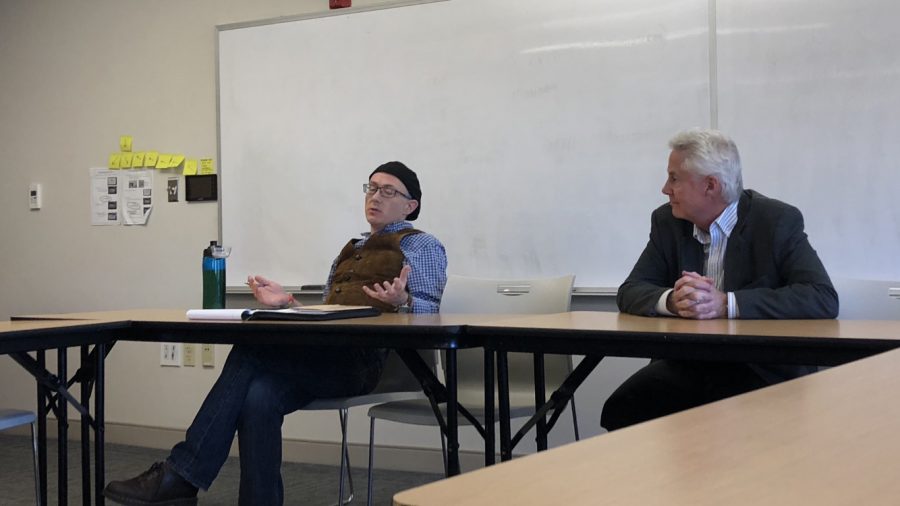Professor Durham leads an in-depth discussion about the nature of science
Professor Bouchard (right) listens intently as Professor Durham (left) discusses his perspective on science and truth.
November 4, 2018
Once a week, thinkers from all around campus can be found gathering together to discuss the toughest, most thought-provoking questions.
Hosted by the Gregory J. Grappone Humanities Institute, these discussions are led by a different member of the Saint Anselm community each week. These conversations, known as Come Friday Forums, include a range of participants such as students, faculty, and members of the monastic community.
On Oct. 19, the driving question behind the conference asked, “Are there any questions science can’t answer?”
The discussion was led by Professor Ian Durham, a member of the Physics Department, and an audience gathered at 12:30 p.m. in the LLC Main Meeting Room to hear this exchange of views.
When Professor Durham begins the discussion, he starts with a quote from Arthur Eddington, who called science “the rational correlation of experience.”
While Eddington was a man of many fields, he was – most prevalently to the discussion – a philosopher of science. Being such a broad subject, it can be hard to nail down exactly what “science” entails, but Professor Durham requests that the audience keep Eddington’s description in mind.
The topic gradually moves to the expected considerations. Science cannot fully explain why someone may find a work of art beautiful. Science cannot prove or disprove beyond doubt the existence of God. Science cannot even prove one’s existence is completely as they perceive it to be.
After broaching these topics, Professor Durham admits, “I’ve kind of given away the punchline there.”
The implication here is that science has restrictions by its very nature of being a human endeavor. Humans are not omniscient, and not everything can be answered using empirical evidence.
That fact is certainly not to say science is purposeless. For every question that science cannot answer, there are many more that science can answer.
As Professor Durham says, “Science is quite arguably the most successful endeavor in human history. For good or bad, technology is a result of science. Science has led to increased lifespans.”
This detour clarifies that the intention of the discussion is not to tear down science. Rather, the aim is to explore the capabilities and limitations of science in a vast, sometimes confusing world.
Professor Durham continues, “I don’t like the word truth. I can’t prove certain things. I can’t prove that I’m not just dreaming this entire interaction.”
To this, Professor Joseph Spoerl questions why he would limit knowledge to this capacity.
Professor Durham responds, “I’m not. I’m limiting scientific knowing to that. There are other forms of knowing, but science has baked in limitations.”
Adding to this, he explains, “That’s not to say it’s a limitation that should stop us from going further.”
At the end of the day, science may not be able to answer all our questions, but one could argue that all fields of study have certain restrictions.
It is only through a combination of these different studies that mankind may gain a better understanding of the world.
Summarizing this point, Professor Durham says, “Let’s take art, for example, there are certain things that art does that science just doesn’t do. That’s the beauty of what we have, especially at a liberal arts college. There’s not just a science department or just an art department. There are different ways of approaching things and knowing things.”
The next Come Friday Forum asks, “Do more people suffer from depression and mental illness than in the past?”
This discussion will be led by Professor Kathleen Flannery of the Psychology Department on Oct 26. The following week’s question is: “Why did Frankenstein affect everything after Frankenstein?” This topic will be facilitated by Professor Meg Cronin of the English Department on Nov 2.



